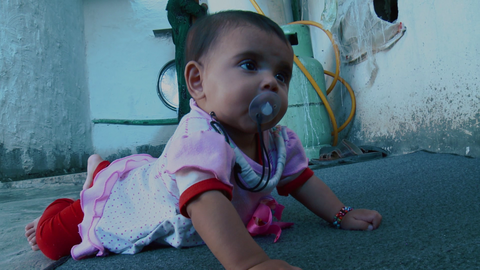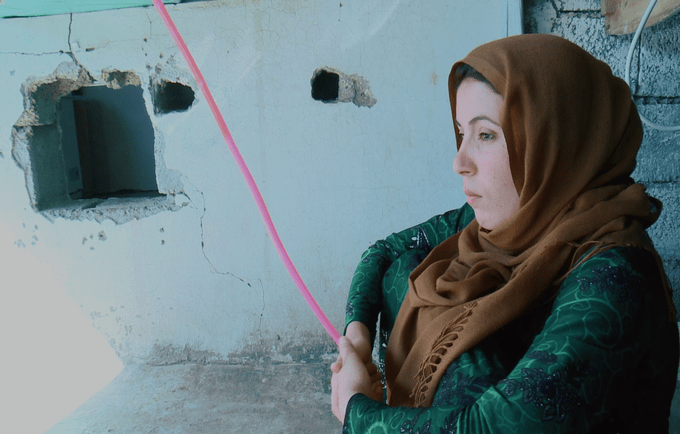Nadia was only 16 when she grabbed her toddler and fled her house in Huwaija, Iraq, while five months pregnant. ISIS had taken over their town two years earlier and, on this fateful night, persistent bombing drove Nadia and many other families out from their houses in the middle of the night.
“I was afraid I was going to miscarry, and I soon ran out of milk for my son,” Nadia recalled, “After five hours of walking, we heard ISIS fighters set up a trap to capture us and we knew they would kill those who are caught. So, I turned around and went home. Our fear got the best of us.”
Growing up, Nadia had pictured a very different future for herself. She had a single, simple dream: to become a school teacher. But the fighting forced her out of school. One year after ISIS’s arrival, she was married off to an older man.

health clinic in Debaga camp for Internally Displaced Persons (IDPs).
“I was forced. I was just a child, only 15 years old. I didn’t want to be married,” Nadia said as anger flashed briefly across her young face.
Eight months into the marriage, her husband was taken by ISIS and she never heard of him again. She was already pregnant when he disappeared. She was married again soon after, this time as a second wife. She was 16 when she became pregnant for the second time and had to embark on that first failed attempt to flee her home.
Soon after, she decided to make one more attempt to reach Debaga camp for the internally displaced- a 15-hour walk. She left with her toddler and her husband and many more families from Huwaija. Halfway to Debaga, they stopped, too scared to move forward and unable to turn around. They set up an impromptu encampment in the middle of nowhere where they stayed for a few months.
“There was no food and no water, and our children got sick,” Nadia said, “Most families were ruined.”
Nadia was getting closer to her due date. So, Nadia’s family decided to make a final push for Debaga despite the fear and they finally made it to the camp.
Upon arriving in Debaga, Nadia went to the UNFPA reproductive health clinic where she delivered her second child: a daughter she named Sewar. She also frequents a safe-space for women and girls in the camp where she learns sewing and has a chance to socialize with other mothers.
Nadia is one of millions of women and girls in the Arab region whose lives, dreams and plans for the future were unexpectedly interrupted by wars they didn’t start. In such situations, Nadia’s predicament is not a rarity. Girls are more likely to leave school than boys their age when disasters strike. They are also 90% more likely to drop out of school than girls who live in conflict-free countries.
Child and forced marriage rates tend to rise in humanitarian emergencies as families pressure their daughters to marry for protection or to alleviate the economic hardship that is a staple of conflict-torn communities. The medical complications of pregnancy and childbirth come hand in hand with child marriage. Such complications are the leading cause of death for adolescent girls aged 15-19.
Pregnant women on the move and in difficult-to-reach areas run a higher risk of maternal mortality and morbidity. Overall, a woman dies every 3 minutes from pregnancy and childbirth complications in humanitarian emergencies. This means over 500 women losing their lives every day for mostly preventable causes.
Four years after fighting first broke out in her small town, the 18-year-old Nadia now finds it difficult to speak of the future.
“I don’t know how to describe my dreams to you,” Nadia said, “Life in the camp is sometimes good and sometimes not, but I dream of going home.”
UNFPA in Iraq:
In 2018, UNFPA reached 742,469 people with reproductive health services, and provided support to 296,773 to survivors of gender-based violence through 76 maternal health facilities and 108 safe spaces for women and girls.


